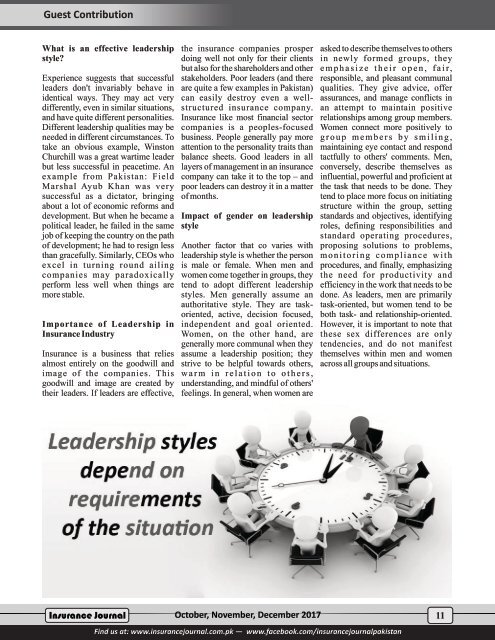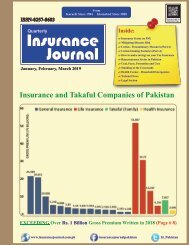Insurance Journal (4th Quarter 2017)
Create successful ePaper yourself
Turn your PDF publications into a flip-book with our unique Google optimized e-Paper software.
Guest Contribution<br />
What is an effective leadership<br />
style?<br />
Experience suggests that successful<br />
leaders don't invariably behave in<br />
identical ways. They may act very<br />
differently, even in similar situations,<br />
and have quite different personalities.<br />
Different leadership qualities may be<br />
needed in different circumstances. To<br />
take an obvious example, Winston<br />
Churchill was a great wartime leader<br />
but less successful in peacetime. An<br />
example from Pakistan: Field<br />
Marshal Ayub Khan was very<br />
successful as a dictator, bringing<br />
about a lot of economic reforms and<br />
development. But when he became a<br />
political leader, he failed in the same<br />
job of keeping the country on the path<br />
of development; he had to resign less<br />
than gracefully. Similarly, CEOs who<br />
excel in turning round ailing<br />
companies may paradoxically<br />
perform less well when things are<br />
more stable.<br />
Importance of Leadership in<br />
<strong>Insurance</strong> Industry<br />
<strong>Insurance</strong> is a business that relies<br />
almost entirely on the goodwill and<br />
image of the companies. This<br />
goodwill and image are created by<br />
their leaders. If leaders are effective,<br />
the insurance companies prosper<br />
doing well not only for their clients<br />
but also for the shareholders and other<br />
stakeholders. Poor leaders (and there<br />
are quite a few examples in Pakistan)<br />
can easily destroy even a wellstructured<br />
insurance company.<br />
<strong>Insurance</strong> like most financial sector<br />
companies is a peoples-focused<br />
business. People generally pay more<br />
attention to the personality traits than<br />
balance sheets. Good leaders in all<br />
layers of management in an insurance<br />
company can take it to the top – and<br />
poor leaders can destroy it in a matter<br />
of months.<br />
Impact of gender on leadership<br />
style<br />
Another factor that co varies with<br />
leadership style is whether the person<br />
is male or female. When men and<br />
women come together in groups, they<br />
tend to adopt different leadership<br />
styles. Men generally assume an<br />
authoritative style. They are taskoriented,<br />
active, decision focused,<br />
independent and goal oriented.<br />
Women, on the other hand, are<br />
generally more communal when they<br />
assume a leadership position; they<br />
strive to be helpful towards others,<br />
w a r m i n r e l a t i o n t o o t h e r s ,<br />
understanding, and mindful of others'<br />
feelings. In general, when women are<br />
asked to describe themselves to others<br />
in newly formed groups, they<br />
e m p h a s i z e t h e i r o p e n , f a i r,<br />
responsible, and pleasant communal<br />
qualities. They give advice, offer<br />
assurances, and manage conflicts in<br />
an attempt to maintain positive<br />
relationships among group members.<br />
Women connect more positively to<br />
g r o u p m e m b e r s b y s m i l i n g ,<br />
maintaining eye contact and respond<br />
tactfully to others' comments. Men,<br />
conversely, describe themselves as<br />
influential, powerful and proficient at<br />
the task that needs to be done. They<br />
tend to place more focus on initiating<br />
structure within the group, setting<br />
standards and objectives, identifying<br />
roles, defining responsibilities and<br />
standard operating procedures,<br />
proposing solutions to problems,<br />
m o n i t o r i n g c o m p l i a n c e w i t h<br />
procedures, and finally, emphasizing<br />
the need for productivity and<br />
efficiency in the work that needs to be<br />
done. As leaders, men are primarily<br />
task-oriented, but women tend to be<br />
both task- and relationship-oriented.<br />
However, it is important to note that<br />
these sex differences are only<br />
tendencies, and do not manifest<br />
themselves within men and women<br />
across all groups and situations.<br />
<strong>Insurance</strong> <strong>Journal</strong> October, November, December <strong>2017</strong><br />
11<br />
Find us at: www.insurancejournal.com.pk — www.facebook.com/insurancejournalpakistan


















